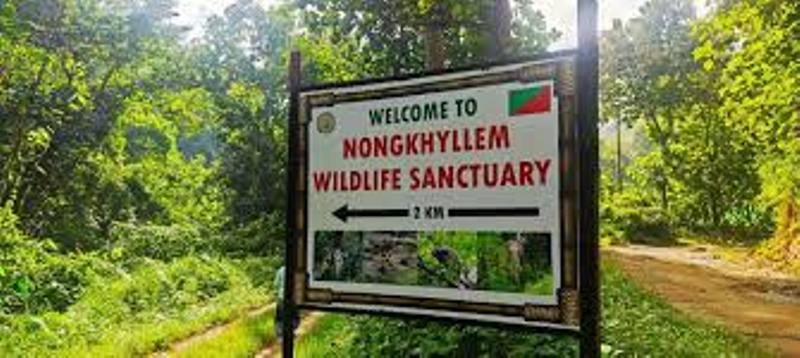Shillong: The Green-Tech Foundation, a Meghalaya-based environmental organization, has strongly opposed a proposed eco-tourism infrastructure project within the Nongkhyllem Wildlife Sanctuary, citing grave concerns for the area’s rich biodiversity and its protected status.
In a statement released recently, the foundation highlighted the sanctuary’s ecological significance and questioned the state government’s decision to potentially curtail its area for tourism development.
Nongkhyllem Wildlife Sanctuary in the Ri Bhoi district has been recognized as the best-protected area in the entire North East region, according to a Management Effectiveness Evaluation (MEE) report.
Established as a sanctuary in 1981, its initial conservation efforts focused on preserving iconic species like Bison (Gaurs) and leopards.
Spanning a relatively small area of 29 sq. km, the sanctuary is considered a vital haven for biodiversity in a state that has reportedly lost over 84 sq. km of forest cover between 2021 and 2023.
The Green-Tech Foundation expressed dismay that the Meghalaya government would consider allowing infrastructure development within this crucial ecological zone, especially given its limited size.
It argued that wildlife sanctuaries are essential for biodiversity to flourish undisturbed and should be left untouched by projects that could lead to habitat disruption and increased human-wildlife interaction.
The foundation also raised concerns over the alleged silence of key state officials, including the Principal Chief Conservator of Forest and the Chief Secretary, regarding this potential threat to a highly protected area.
“It is also horrifying that the State’s Principal Chief Conservator of Forest and the Chief Secretary have remained silent on this matter when such a protected area is under direct threat of pressure on biodiversity and potential risk of extinction that would occur with tourist inflow along with unregulated anthropogenic activities,” it said.
The foundation emphasized that Nongkhyllem Wildlife Sanctuary is not suitable for any infra project since the area of the sanctuary is of only 29 sq. km, which makes it particularly unsuitable for any infrastructure project as it would inevitably limit the thriving biodiversity that has been carefully preserved over decades.
Highlighting the sanctuary’s minimal biotic interaction as a positive factor for its biodiversity, the Green-Tech Foundation warned that the proposed infrastructure project would have detrimental impacts on its well-maintained ecosystem.
They pointed out that while eco-sensitive zones around sanctuaries allow for development, such projects should not be implemented within the protected areas themselves to avoid disturbing wildlife habitats.
Notably, an Eco-Sensitive Zone has already been declared around Nongkhyllem Wildlife Sanctuary by the Ministry of Forest, Environment and Climate Change in 2017.
Drawing parallels with a biodiversity-disrupting infrastructure project in Hyderabad’s Kancha Gachibowli, the foundation also alluded to a recent order by the High Court of Meghalaya emphasizing the need to preserve trees unless they pose an immediate danger.
“It cannot be said that the said infra project will not come at a cost of tree felling, making way for a chalet-style resort and water sports zone,” the foundation stated.
The Green-Tech Foundation stressed the limited number of wildlife sanctuaries and national parks in Meghalaya (four and two respectively), underscoring the importance of their pristine preservation.
It said, “We vehemently oppose the proposed eco-tourism infrastructure project, valued at approximately Rs 23.60 crore, within the Nongkhyllem Wildlife Sanctuary. We firmly urge the Government of Meghalaya to reconsider its decision and, in the best interest of preserving the sanctuary’s natural integrity and pristine biodiversity, withdraw the awarded EPC Contract. Human interference and interaction, beyond essential research, academic pursuits, and allied activities, must be avoided.”
ALSO READ: Meghalaya: East Khasi Hills admin bans illegal fishing in Umiam
Instead of developing within the sanctuary, the foundation suggested that public funds be directed towards the development of communities surrounding Nongkhyllem Wildlife Sanctuary.
This approach, it argued, would improve livelihoods while simultaneously sustaining both the communities and the biodiversity within the protected area.















